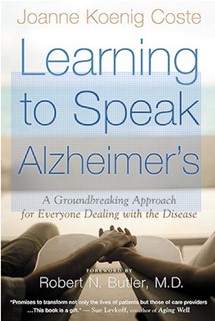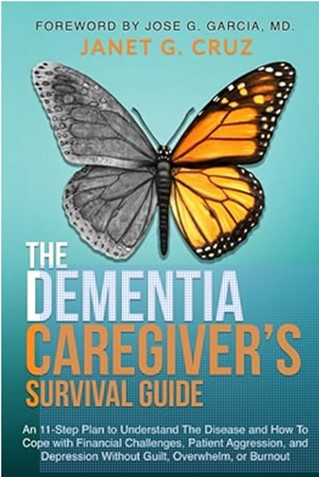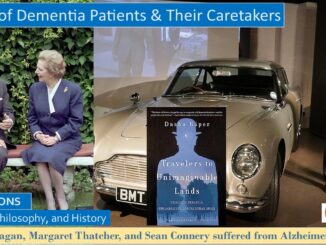
This is a personal story from which we can learn much about the dilemmas encountered when dealing with the elderly with advanced dementia.
I was not very popular when I halted the foreclosure for unpaid condominium maintenance fees of a destitute owner with advanced dementia who was taken advantage of by a much younger alcoholic girlfriend, until the court could appoint him a guardian to find him a place to stay and to sell his unit and pay off the fees in due course. His demented behavior had totally alienated him from many in our community, and they felt little pity towards his condition.
Alzheimer’s disease is the main type of dementia, there are other types also.
YouTube script, with Amazon book links:
https://www.slideshare.net/BruceStrom1/how-i-halted-a-foreclosure-on-a-destitute-owner-with-advanced-dementia-we-discuss-dementia
YouTube video: https://youtu.be/_uAJPCCRNQ8
There is no need to name my community, this is an action that would have been taken by many over-55 communities who really do not know how to deal with owners who are suffering from advanced dementia, they think that their unacceptable behavior is their fault, and they feel no pity. Rather than blame my fellow officers, we must realize that this is a story we can all learn from.
Recently my fellow over-55 condominium officers sent me a threatening attorney letter and passed a vote of no-confidence, urging me to resign from my position, in large part because about six months ago I stopped a foreclosure sale of an owner who had advanced dementia, who was destitute because his alcoholic younger girlfriend had stolen all his money, who had no family or friends, and whose demented behavior had totally alienated many in our community.
I remember very vividly the meeting that was called to discuss a certain Robert who was seriously behind on his maintenance fees. Robert had been a problem for the community for years. He had been in collections for years, the attorney would call his condominium and would arrange a payment plan, a few payments were made, and then the payments would stop. This happened over and over again.
In addition, there were many complaints. The neighbors complained, and the police were called many times for disturbances. Not only that, but often he would wander into the office and harass our clerks, everyone was just annoyed with him, everybody had enough of him.
A special meeting was called to discuss whether we would foreclose. The attorney told us that the latest deal was that he would pay three thousand down and pay the remaining balance in payments. The attorney never received the three thousand dollars. This meeting was convened at the insistence of Maureen, a board member. She confirmed that, as a neighbor, she too was annoyed at his behavior. But she warned us emphatically that his behavior was just plain strange, he was just not well, and she pleaded with us not to initiate the foreclosure proceedings. A vote was taken to initiate the foreclosure.
Listening to this, I both had a very bad feeling about this, and also a feeling of discordance. The complaints about his harassing behavior were very real and credible, but Maureen’s description sounded to my untrained ear to resemble dementia. But that did not make sense either, because: Who was the attorney negotiating with? Whoever was negotiating with the attorney had no cognitive impairments.
Some months before I had noticed on the bulletin board a card for Mercy Mesericordia, who is head of a guardianship service. Guardians can take over the affairs of clients who are incapacitated, usually cognitively. Nobody knew who she was, that card had been on our bulletin board for years. I called Mercy simply to learn more about dementia, how we could spot it, what services were available, just general information. We start talking and she’s telling me this and that and I said and after a while I said that we have a fellow that might have dementia, and I really did not know that, but that the process was too far along to do anything about it, because the foreclosure was scheduled for Friday.
Mind you, I was discussing this with her on Tuesday.
Mercy pipes up excitedly and says, “Of course, we can do something about this! We have plenty of time! We can stop this foreclosure; it is not scheduled until Friday!”
When Mercy said this, I said to myself: “Mercy me! This lady is not just a bureaucrat! She really cares about these poor people!” But the vote was so certain that I knew it would be futile to try to get my fellow officers to change their mind, because the foreclosure is Friday! How can we buy time?
Wednesday morning, before the foreclosure, on my own, on my personal email, personally, not as an officer, I offered the three thousand dollars to stave off the foreclosure. Once that happened, and the foreclosure was halted, we could figure out what to do. Mercy would meet me at Robert’s condominium to assess the situation.
We both arrive at his door on Wednesday afternoon, and we knock on the door. Nothing, no answer. We knock again. Again, no answer. What to do now? Maybe Robert is wandering around. Where could Robert be? But finally, Robert opens the door, and sweet Mercy talks him into letting us in, and she is trying to talk to him. After talking for just a few minutes we realize he has no idea that he owes maintenance fees, he has no idea that he is facing foreclosure, he literally does not know the name of the month. Advanced dementia, looney as a tune, and that was Mercy’s diagnosis. Clearly, there was nobody for me to negotiate with. Robert cannot enter into legal agreements, he needs a guardian, and that takes court hearings.
Mercy is a professional, she knows what she is doing. She starts looking around, the refrigerator is nearly empty, but there are some food containers laying around. The neighbors have been feeding him. So, I go to Burger King and buy him his dinner. We looked in the association records, we look for numbers to call, we find no clue of any relatives we can contact.
Who was the attorney negotiating with? On the floor are boxes with clothes and school supplies for his ex-girlfriend and her young daughter. He says they have broken up and she will come back for her clothes. She was the somewhat-cognizant one, and I say somewhat because she was an alcoholic. Maybe she left because the money ran out? Frantically, I email and call the attorney and tell him he has to call off the foreclosure, this is horrible. The ex-girlfriend was negotiating with him in bad faith.
Mercy learns that I have offered three thousand dollars of my own money to the attorney. She ups the ante. Thursday morning, she calls an emergency board meeting of her non-profit organization, she obtains approval to offer the attorney the full seven thousand dollars to call off the foreclosure. She speculates she should be able to be appointed guardian in this case, but she did not know for sure if there were any relatives out there that would gum up the court hearings. Her agency is a small organization. But she took the risk.
The attorney declines the seven thousand dollars, calls off the foreclosure, confident that Mercy would be able to be appointed Robert’s guardian by the court, that she would, in due course, sell the property and remit the association what they are due at closing. Which is what happened.
This story had a happy ending, a sad ending, and an okay ending. The happy ending is that Robert is now in a secure facility for Alzheimer’s patients from which he cannot escape. Mercy, to her credit, took her time finding a place to place him. Several facilities she rejected because the patients were walking around like zombies, they had been heavily sedated so they wouldn’t cause problems. The facility had some behavior problems with Robert, but he has settled down, and he thinks he is one of the managers of the facility, and they let him boss people around. Maureen has gone to visit him with another neighbor and maybe I’ll go with them next time. Robert probably would not recognize who I am, he definitely has no idea of what I went through to ensure he is now in a good place. All he knows is now he is in his new happy home.
The sad ending is that the girlfriend died from her alcoholism several months ago. When Mercy told me that, I asked her: What about the daughter? She calls me back; the daughter is with her dad. Is her dad an okay dad? I do not know, so that is only an okay ending.
And yes, everyone was upset with me. And yes, many people are still upset with me. Now some call me the conscience of the association. Some are still upset with me.
We did discover that Robert has a sister, she is estranged from him and relinquished all her rights to Mercy, the guardian. We do not know when this happened, but we can ask an unsettling question: Did his demented behavior repel her?
The truth about dementia is this, not only does it steal your recent memories, your cognition, your ability to perform daily tasks of living, dementia also steals your moral compass. You lose your inhibitions. If you were docile before, you will become more docile; if you were cantankerous before, you may become downright ornery; if you thought inappropriate thoughts, you may be more likely to act out these dark thoughts. Those suffering from dementia cannot really control their actions, they are at the mercy of their emotions, and whatever they do is not their fault.
We ran these observations past a spokesperson for the Alzheimer’ Association, and he said that there are other reasons why sometimes those with dementia are aggressive, referring me to their website. In their words: “Aggressive behaviors may be verbal or physical. They can occur suddenly, with no apparent reason, or result from a frustrating situation. While aggression can be hard to cope with, understanding that the person with Alzheimer’s or dementia is not acting this way on purpose can help.”
Why are Alzheimer’s patients often aggressive? They are incapable of taking care of themselves, they could be suffering and don’t know why. Perhaps they are not eating or drinking right, maybe they have a urinary tract infection, maybe they are in pain, maybe they are sleep-deprived, maybe loud noises or commotion is upsetting them, some patients get upset when the sun goes down. The Alzheimer’s website discusses how caretakers can deal with this. ONE FACT IS TRUE: Their demented behavior is NOT THEIR FAULT.
WHAT ARE THE ODDS OF SUFFERING FROM DEMENTIA?
What are the odds of developing dementia? Over 65, one in fourteen; over 80, one in six., average of 7.1% over 65. Which leads to an uncomfortable question, out of the roughly thirty people active on our condominium board or are officers, Who, among you, will be the two who will go mad? If you have no friends, no family, would you hope that there will be strangers willing to look after your best interest? If you have friends now, you may drive them away by your dementia.
WHAT MORE CAN WE LEARN FROM THIS INCIDENT?
What are the lessons we should learn from our discussion of the case of Robert’s foreclosure?
First, we should be very reluctant to foreclose on someone whom we suspect may have dementia. I would like to point out that one of the first warning signals of dementia is an inability to manage your personal finances. Everybody knows this, the police know this, the social agencies know this, and now you know this. Before we send someone to foreclosure, a few weeks prior you can simply call the police and ask them to perform a welfare check, and WE MUST tell them they have not been paying their fees and we are considering foreclosure.
The very word FORECLOSURE will set off warning bells. These warning bells will greatly increase the chance that the social welfare agencies will become involved in the case to resolve the situation, and indeed will provide them with the leverage they need to get involved and resolve the situation.
I live in Florida, a former Confederate state with no income tax where the social safety net is threadbare. Like it or not, the police are tasked with doing welfare checks. Many of them take this role seriously. Unfortunately, demented behavior is often anti-social behavior, and often they do not notice the underlying dementia.
I often say this is a joke, but I always mean it to be true, that if any elderly person is very irritable towards you, we can never exclude the possibility that may be showing early forms of dementia. This is very true, and we have instructed the office staff to keep the property manager and others informed when a resident is exceptionally rude to them for this very reason. Dementia is a creeping disease.
WHAT HAPPENS WHEN THE HOMELESS OR ALCOHOLICS MARRY THE DEMENTED?
We were lucky in Robert’s case in one respect, and Robert was lucky, because his girlfriend never talked him into marrying her. There was another situation that I was not involved with, that the police told me about, was where an elderly lady with dementia was preyed upon by a homeless individual who persuaded her that he was in love with her. When the police caught wind of it and tried to get him thrown out, he immediately went down to the courthouse and married her. He was then untouchable, and he next had a grand time at the Hard Rock café and gambled away all of her money. The police could do nothing about it because he was her husband.
HOW SHOULD WE PROACTIVELY INTERVENE?
The family members must keep in touch with their elderly parents and grandparents and be assertive in setting up a guardianship with them as guardians sooner rather than later. If you are not assertive, then you run the risk of a social parasite, a much younger alcoholic or homeless person or never-do-well, will pander to them, and if they are married, you are often helpless to stop the pilfering of their assets.
For our community, we only collect emergency contact information when the owner purchases the unit. Decades later, when we need to review this information, often the files are lost, or all the phone numbers have been disconnected. Every decade or so this emergency contact information must be updated so everyone knows who to call. Also, it is critical you put your emergency contact information, and medical instructions and where to find wills on your refrigerator or the inside of your front door, so emergency responders know it is there.
Be alert, and if someone over seventy, or sometimes younger, behaves in grotesquely inappropriate behaviors, if they are threatening or are indecent, you just cannot rule out dementia.
You must remember, there are brain scans and other tests that doctors can run to confirm the existence of dementia in the elderly who appear to be misbehaving and are an irritation to the community. These diagnoses are not solely dependent on judgmental observations of behavior, though this is a secondary indication. If someone is behaving strangely, have them tested, don’t just assume that they are in full control of their actions.
Are we our brother’s keeper? Unfortunately, the answer received by Cain in Genesis still applies today, YES, we are our brother’s keeper.
DISCUSSING THE SOURCES
Most of my sources are the social workers and policemen with whom I consulted in this personal experience, and also online discussions and information from the Alzheimer’s Association website, www.ALZ.ORG.
We next plan to review the end-life stories of celebrities who suffered from Alzheimer’s, including Tony Bennett, Glen Campbell, and Rita Hayworth, and also general information about Alzheimer’s, including warning signs, caretaking hints, and legal implications. Other celebrities who suffer from other types of dementia include Robin Williams and Ron Howard of Happy Days.
The books we have listed are Travelers to Unimaginable Lands, stories about dementia, and the famous book, The Man Who Mistook His Wife for a Hat, which includes clinical stories about patients suffering from neurological diseases, including some dementia stories. And we have the 2022 Dementia Overview, on all the common types of dementia.
The past fifty years have seen a shift from a paternalistic health care system where the doctors wielded enormous power over the mentally ill, to the current HIPPA obsessed system where the patient is empowered. This empowerment often harms those suffering from dementia, since it leads to unfortunate situations where people can take advantage of those patients with dementia, especially when someone much younger convinces them to marry them so they can drain their assets.
This patient-empowering movement may have been influenced by the anti-psychiatry movement Michael Foucault, RD Laing, and Thomas Szaz. I was disappointed when I learned from Dr Wikipedia that Szaz had cooperated with the Scientology movement, although he did not personally become a Scientologist. The Right to be Different may have been an influential legal and psychological book in this movement.











8 Trackbacks / Pingbacks